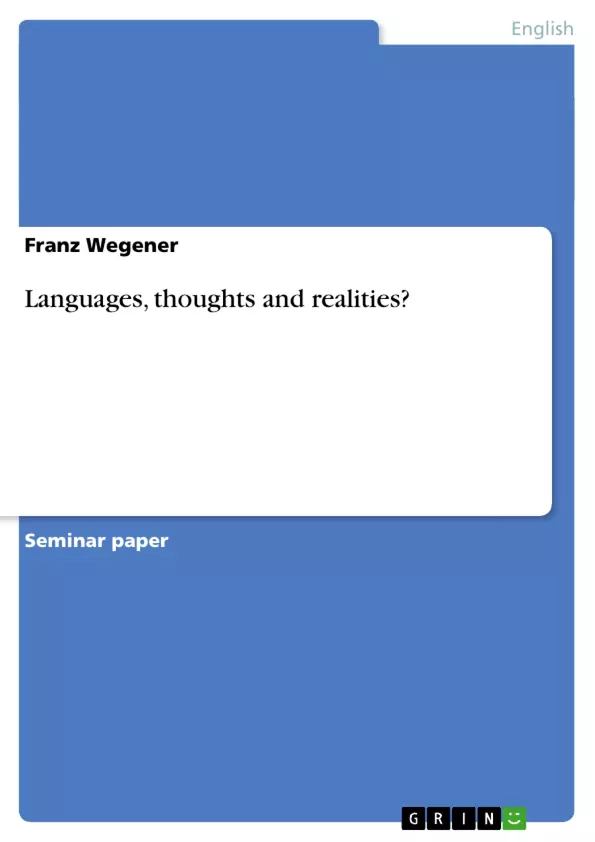This paper analyzes Whorf’s hypothesis that thinking is determined and limited by the language used. This hypothesis implies that certain thoughts can only be expressed in one language, but not in another. Thus, a text given in the first language that is about such thoughts could not completely be translated into the second one.
In this paper Nagel’s and Davidson’s notion of the concept scheme is used to refute Whorf’s hypothesis in every way it could possibly be interpreted. Furthermore, it shows practical ways of how any natural language that could possibly exist or be designed in the universe can effectively be translated into any other language. To answer all the questions that arise, this paper creates a bridge between linguistics, philosophy, psychology and epistemology (theory of knowledge).
Inhaltsverzeichnis (Table of Contents)
- Introduction
- Whorf's Hypothesis
- Problems in Translation
- The Method of Translation
- The Access to Reality
- Cause and Consequence in Whorf's Hypothesis
- Languages and Concept-schemes
- Summary and Conclusion
Zielsetzung und Themenschwerpunkte (Objectives and Key Themes)
This essay examines the relationship between language and thought, specifically investigating whether restrictions in language can prevent us from thinking in certain directions and analyzing the consequences. It aims to answer the question posed by George Orwell's novel "Nineteen Eighty-Four" - can manipulating language restrict our thoughts?
- The influence of language on thought
- The concept of "untranslatability" between languages
- The role of concepts in language systems
- The evolution and change of language systems
- Whorf's hypothesis and its implications
Zusammenfassung der Kapitel (Chapter Summaries)
- Introduction: This chapter introduces the idea that language can restrict thought, drawing upon George Orwell's dystopian novel "Nineteen Eighty-Four" as a starting point. It highlights the potential implications of language manipulation and poses the key question of whether restrictions in language can influence our thought processes.
- Whorf's Hypothesis: This chapter delves into the work of Benjamin Lee Whorf, a proponent of the idea that language strongly influences thought. It explores Whorf's arguments regarding the complexity of language systems and the slow process of language change. It also introduces the concept of how language limitations can lead to the loss of concepts.
- Problems in Translation: This chapter focuses on the challenges of translation between languages, specifically addressing the potential for "untranslatability" due to differing conceptual structures. It cites the work of Berlin and Kay, who investigated the meaning of color terms in English and Hanunóo, highlighting the potential for language-specific conceptual frameworks.
Schlüsselwörter (Keywords)
This essay explores the relationship between language and thought, focusing on Whorf's hypothesis and the concept of "untranslatability" between languages. It examines the role of concepts in language systems, the evolution of language, and the potential for language manipulation to influence our thoughts. Key themes include language restrictions, thought processes, conceptual frameworks, and the challenges of translation.
Frequently Asked Questions
What is Whorf’s hypothesis?
The hypothesis suggests that our thinking is determined and limited by the specific language we use.
Does language manipulation restrict thought?
Drawing on Orwell's "1984," the paper investigates if limiting language can prevent certain thoughts from being formed.
What is the "concept scheme" used by Nagel and Davidson?
It is a philosophical notion used in this paper to refute Whorf’s hypothesis by showing that different languages can still share or translate underlying concepts.
Is anything truly untranslatable?
The paper argues against absolute untranslatability, suggesting that natural languages can effectively be translated into one another through conceptual bridges.
How do Berlin and Kay’s color studies relate to this?
Their research on color terms in different cultures is used to analyze how language-specific frameworks handle universal sensory experiences.
- Citar trabajo
- Franz Wegener (Autor), 2003, Languages, thoughts and realities?, Múnich, GRIN Verlag, https://www.grin.com/document/37687



